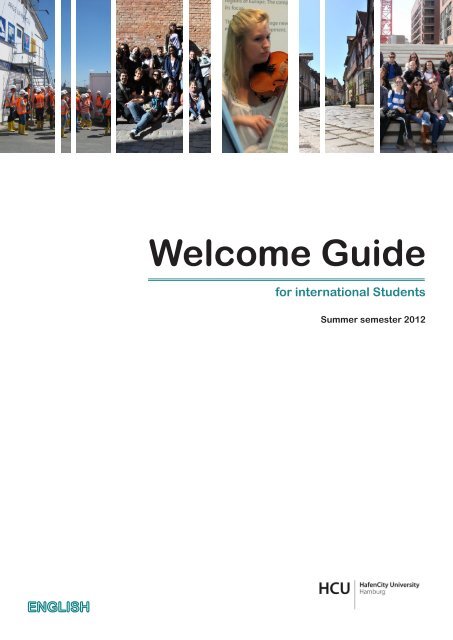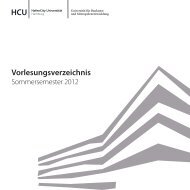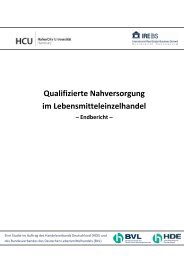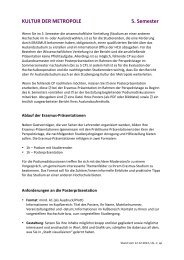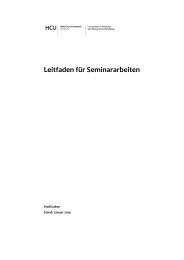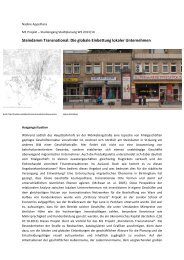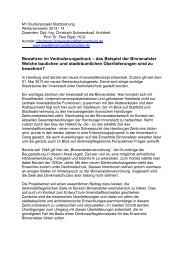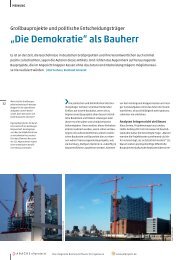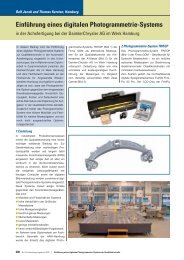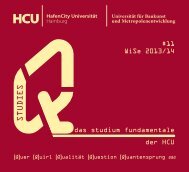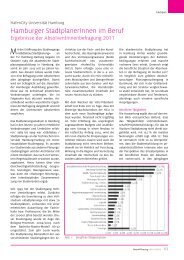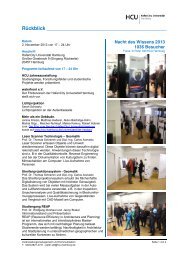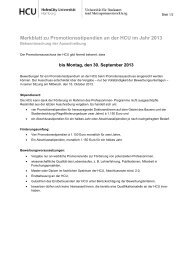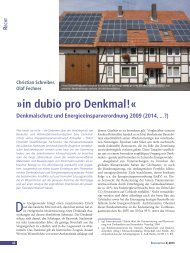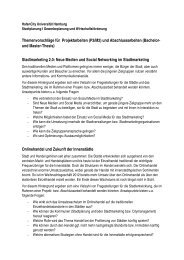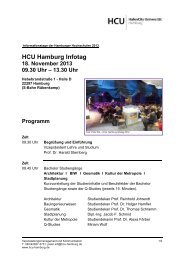Welcome Guide - HafenCity Universität Hamburg
Welcome Guide - HafenCity Universität Hamburg
Welcome Guide - HafenCity Universität Hamburg
Create successful ePaper yourself
Turn your PDF publications into a flip-book with our unique Google optimized e-Paper software.
<strong>Welcome</strong> <strong>Guide</strong><br />
for international Students<br />
Summer semester 2012
Index of Contents<br />
1 Before your arrival 5<br />
1.1 Applying for matriculation<br />
1.1.1 Applying for matriculation for ERASMUS Students and Free Movers 5<br />
1.1.2 Semester contribution for ERASMUS Students 6<br />
1.1.3 Student Health Insurance 6<br />
2 Arrival in <strong>Hamburg</strong> 9<br />
2.1 Applying for a Visa (for non-EU Students) 9<br />
2.2 From the <strong>Hamburg</strong> Airport 10<br />
2.3 Looking for an Apartment 10<br />
2.3.1 Student Dormitories 11<br />
2.3.2 Communal Living („WGs“) and a flat-sharing agency „Mietwohnzentrale“ 11<br />
3 First Days in <strong>Hamburg</strong> 12<br />
3.1 Registration with the Authorities 12<br />
3.1.1 General Freedom of Movement Certificate for EU Citizens 13<br />
3.2 Banking: Opening a Current Account 14<br />
3.3 Public Transport 15<br />
4 Studying at the HCU 16<br />
4.1 International <strong>Welcome</strong> Week (Mo. 26th March - Fr. 30th March 2012) 16<br />
4.2 Seminar, Lecture and Course Information 16<br />
4.3 Structure of the Study Year 17<br />
4.4 Advisory service during your Studies 17<br />
4.5 „Rückmeldung“: Confirming Your Place for the Next Semester 18<br />
5 Buildings and Facilities 18<br />
5.1 International Office (IO) 18<br />
5.2 HCU Locations 19
5.3 Information and Media Center (IMZ) 19<br />
5.4 Computer Pools 20<br />
5.5 Printing services (Plotservice: Blueprints, Drafting Plans etc.) 21<br />
5.6 FrontOffice/Infothek 21<br />
6 IT 21<br />
6.1 User Account 22<br />
6.2 HCU Email Address 22<br />
6.3 WiFi (WLAN) 22<br />
6.4 Stud.IP and Ahoi 23<br />
7 Living in <strong>Hamburg</strong> 23<br />
7.1 YOU@HCU 23<br />
7.2 University Sports 23<br />
7.3 HVV (Public Transport) 24<br />
7.4 Telephone and Mobile Phone 24<br />
7.5 Emergency Numbers 24<br />
7.6 Medical Care: What to do if you get sick and need a doctor 25<br />
7.7 National Holidays 2012 26<br />
7.8 Travelling by Train with DB (Deutschen Bahn) 26<br />
Appendix: Locations and Offices of the <strong>HafenCity</strong> University
First and foremost, we would like to warmly welcome you to the <strong>HafenCity</strong> University. Whether you<br />
are here for one semester, one year or your full studies, this will likely be one of the most exciting, as<br />
well as complicated, times of your life. You probably have a lot of questions, many of which can be<br />
answered by this <strong>Welcome</strong> <strong>Guide</strong>. Here you can also find various information and tips for studying<br />
and living in <strong>Hamburg</strong>. We, therefore, recommend reading the <strong>Welcome</strong> <strong>Guide</strong> in its entirety.<br />
We wish you all the best for your studies at the HCU and hope that this time will do much to your<br />
personal and academic development. The International Office and YOU@HCU team organize many<br />
activities, to which you are cordially invited. If you have any questions, please feel free to contact<br />
the International Office (https://www.hcu-hamburg.de/en/io/contact-information/ ) or your <strong>Welcome</strong><br />
Buddy.<br />
1 Before your arrival<br />
Even though your time at the HCU might seem to be far and unreal when still staying at home it is<br />
very important that you get prepared for it. For example, you must transfer the semester contribution<br />
and, as the case may be, the tuition fees. You need a student health insurance to be matriculated<br />
at the HCU. You maybe, need a visa to enter Germany and you need a place to live in <strong>Hamburg</strong>. You<br />
will also look for information on HCU courses and would like to know how to register for them.<br />
1.1.1 Applying for matriculation for ERASMUS Students and Free Movers<br />
The ERASMUS Students and the Free Movers get their HCU application per email from the International<br />
Office. The application form must be filled in, printed and signed, then scanned and sent back<br />
per email to the IO: erasmus@hcu-hamburg.de until the 01 of April 2012.<br />
Please capital letters only when filling in the application form. Please do not rewrite Ä, Ö or Ü as AE,<br />
etc.<br />
You have to take the original document with you to <strong>Hamburg</strong> you and give it to the IO. In exchange<br />
you will receive your semester documents. Without the signed original you won´t get your semester<br />
documents!<br />
5
1.1.2 Semester contribution for ERASMUS students<br />
ERASMUS students pay € 245,00 (thus no administration costs).<br />
You have to transfer the semester contribution to the following account:<br />
Recipient:<br />
HCU <strong>Hamburg</strong><br />
Account: 200 015 51<br />
Name of Bank:<br />
Deutsche Bundesbank <strong>Hamburg</strong><br />
Bank code: 200 000 00<br />
IBAN: DE182 000 000 000 200 015 51<br />
SWIFT/BIC: MARKDEF 1200<br />
ERASMUS students please write in under Purpose (Verwendungszweck) “SS2012, First Name, Family<br />
Name, Erasmus Student”. Please send a copy of your bank transfer to erasmus@hcu-hamburg.<br />
de !<br />
Example: “SS2012, Joe Smith, Erasmus Student”.<br />
Important: Check if your bank will charge some fees for the transfer. Only if the complete semester<br />
contribution sum reaches the HCU account your semester documents can be issued.<br />
You can pick up your semester documents at the International Office in the last March week or during<br />
the International <strong>Welcome</strong> Week (Mo. 26th March - Fr. 30th March 2012).<br />
1.1.3 Student Health Insurance<br />
In order to enroll at a german university students have to provide a proof of health and long term<br />
care insurance. This proof is in the form of an insurance certificate issued by a health insurance<br />
company. Therefore, if you do not have a valid European health insurance card, you have to get German<br />
health insurance. More questions? Check this page:<br />
http://ec.europa.eu/social/main.jsp?catId=559&langId=en<br />
If you come from an EU-country or if you have a health insurance from Bosnia and Herzegovina,<br />
6
Serbia, Croatia, Macedonia, Switzerland, Turkey or Tunisia it can be accepted in Germany. Anyway,<br />
you have to provide the following form at a German health insurance company:<br />
• all EU-countries plus Norway, Island, Switzerland und Lichtenstein:<br />
E128 und European Health Insurance Card (EHIC)<br />
• Serbia, Montenegro: Ju 6<br />
• Bosnia and Herzegovina: BH6<br />
• Croatia: HR/D 111<br />
• Macedonia: RM/D 111<br />
• Turkey: T/A 11<br />
• Tunisia: TN/A 11<br />
Please note: Travel health insurance does not meet the requirements!<br />
Students from all other countries:<br />
We recommend to you to take out health insurance with one of the public health insurance companies<br />
in Germany (see below), as the health insurance coverage in other countries is usually not adequate.<br />
Travel health insurance or health insurances from the countries not mentioned above do not<br />
meet the requirements, because the range in the type of provision, in the amount of the provisions<br />
(e.g. up to a maximum of US $ 50,000) and the period of time (e.g. return transport after 90 days) is<br />
limited! ! Only those insurance contracts, which do not have a maximum upper limit, i.e. which do<br />
not have limited coverage per person and per case, provide adequate health insurance coverage<br />
recognized by the HCU.<br />
You might need to provide health insurance for the Germany embassy to open your visa for Germany.<br />
In this case you should contract some kind of travel insurance for the first months.<br />
As soon as you arrive in <strong>Hamburg</strong> we help you to get a student health insurance at a public health<br />
insurance company (like AOK, TK). You can also already now send an email our contact person at<br />
the AOK health insurance (Nadine Seehaus - Nadine.Seehaus@rh.aok.de ) telling/asking her what<br />
you should do to get the AOK student health insurance.<br />
Please contact Ekaterina Wittke (HCU International Office) if you have any questions or need a piece<br />
of advice on student health insurance: Ekaterina.Wittke@hcu-hamburg.de .<br />
7
Where can I get insured?<br />
In Germany there exist compulsory public health insurances (Gesetzliche Krankenversicherung<br />
GVK) and private health insurances (Private Krankenversicherung PKV). Public health insurers all<br />
have the same fees. A few examples of public health insurance companies where you can get insured<br />
include AOK (http://www.aok-on.de/studierende.html ), TK (http://www.tk.de/tk/jetzt-zur-tk/<br />
studenten/118512 - website is in German only)<br />
and DAK (http://www.dak.de/content/dakstudenten/top_versichert.html - (website is in German<br />
only).<br />
You can find a map with all the public health providers in <strong>Hamburg</strong> under<br />
http://maps.google.de/maps?f=q&source=s_q&hl=de&geocode=&q=gesetzliche+krankenkassen<br />
+in+hamburg,+de&sll=53.579054,10.007858&sspn=0.22381,0.617981&ie=UTF8&ll=53.54806,1-<br />
0.024338&spn=0.214183,0.617981&z=11<br />
In order to get your health insurance certificate if you are still abroad (meaning not yet in Germany),<br />
you can refer to our contacts at the AOK (Nadine Seehaus - Nadine.Seehaus@rh.aok.de ) or at the<br />
TK (Ms Jessica Voß, jessica.voss@tk-online.de).<br />
Costs<br />
All members of public health insurance companies pay the same, state-regulated fees. Monthly<br />
costs are generally € 76,41. Members who do not have children and are 23-years of age or older<br />
pay a higher fee of € 77,90. This favorable rate for student insurance is limited to 14 semesters and<br />
ends when the student turns 30-years. Notice that you have to pay the insurance fees for the whole<br />
semester even if leaving Germany earlier than the end of the semester.<br />
An additional monthly fee of eight to fifteen Euro is charged by the DAK, BKK and KHH Allianz health<br />
insurers.<br />
After the obligatory student insurance has ended, international students have to “voluntarily” maintain<br />
their public insurance. Fees for the public insurers vary and are determined based on income.<br />
Under “low income” a legal minimum limit of € 875,00 is used. That means the corresponding premium<br />
(as a % of income) will be calculated based on this figure. The costs are therefore, depending<br />
on the insurer, between € 140 and € 160 per month.<br />
8
Depending on the insurance company, there is, where applicable, a somewhat more affordable “Absolvententarif”<br />
(rate for recent graduates) that can cover a transition period of 6 months.<br />
By the way! BAföG students can receive a subsidy for health insurance fees:<br />
Students receiving BAföG are eligible to receive a subsidy for their health insurance premium.<br />
BAföG recipients paying an own contribution - generally beginning with the 25th birthday or later,<br />
commensurate with completing “Wehr- or Zivildienst” - can apply for a subsidy with Student Services.<br />
They will receive per month € 62 for health insurance and € 11 for long term care insurance.<br />
Required Documents for getting Health Insurance<br />
• Passport or personal identification,<br />
• Proof of residency in the city of <strong>Hamburg</strong> (“Meldebescheinigung”),<br />
• Proof of matriculation (“Semesterbescheinigung”),<br />
• and generally your bank information at a German bank so that the monthly<br />
premium can be automatically withdrawn from your account<br />
Be sure that you have received your health insurance certificate/identification (Krankenversicherungsnachweis)<br />
from your health insurance provider. More information about health insurance:<br />
http://www.studierendenwerk-hamburg.de/downloads/data/Krankeneng.pdf<br />
2 Arrival in <strong>Hamburg</strong><br />
2.1 Applying for a Visa (for non-EU Students)<br />
If you are not from a member state of the EU or EEA (European Economic Area) then you need a<br />
visa to study in Germany. Please contact the German foreign representatives in your home country<br />
in order to apply for a visa covering your study and university preparatory activities (“Visum zum<br />
Studium und für studienvorbereitende Maßnahmen” §16 Abs. 1 AufenthG).<br />
Important! You cannot use a Tourist Visa (Touristenvisum) to travel to Germany for the purpose of<br />
studying. The Immigration Office of the Federal Republic of Germany will not change a Tourist Visa<br />
9
into a Student Visa.<br />
At the German foreign representatives in your country you must present, among others, following<br />
documents:<br />
• a certificate recognized by Germany proving your university entrance<br />
qualifications (uni-assist) (not needed for ERASMUS and exchange students)<br />
• a letter of acceptance or proof of enrollment at the HCU<br />
• health insurance certificate<br />
• proof of necessary living expenses (ca. 670,00 € per month for the length of<br />
you stay in Germany)<br />
For further information contact a German embassy or consulate.<br />
2.2 From the <strong>Hamburg</strong> Airport<br />
Before arriving it is a good idea to use the website of the HVV (<strong>Hamburg</strong>er Verkehrsverbund) http://<br />
www.hvv.de/en/index.php to search for a connection from the <strong>Hamburg</strong> airport or the main train<br />
station to your final destination in <strong>Hamburg</strong>. If you have not received your Semester Ticket yet, you<br />
should be sure to purchase a ticket at an automated machine (ca. 2,85 €).<br />
Our <strong>Welcome</strong> Buddies can gladly assist you upon your arrival in <strong>Hamburg</strong>. If you need a personal<br />
HCU <strong>Welcome</strong> Buddy please drop us a line at welcome-you@hcu-hamburg.de.<br />
2.3 Looking for an Apartment<br />
Many international students already have a place to live while others are still searching. This little<br />
guide serves to help with searching for a place to live and provides information for official registering<br />
in Germany.<br />
Important: It is not at all easy to find an adequate and affordable apartment in <strong>Hamburg</strong> in time for<br />
the beginning of the semester. Therefore, we highly recommend reading up on and beginning the<br />
search even before receiving your letter of acceptance from the HCU and arriving in <strong>Hamburg</strong>!<br />
10
2.3.1 Student Dormitories<br />
The International office of the HCU has a limited number of rooms in student dormitories of Studierendenwerk<br />
<strong>Hamburg</strong>. Exchange students can apply for such a room directly at the International<br />
Office. Application forms will be sent per email. It is not possible for exchange students to apply for<br />
a dormitory room directly by Studierendenwerk <strong>Hamburg</strong> (through the International Office only).<br />
In addition it is possible to contact private student residence halls directly. A list of the houses can<br />
be found at the Student Services:<br />
http://www.studierendenwerk-hamburg.de/wohnen/anderetraeger.php?mid=216&&sprache=english<br />
Dormitories along the periphery, in particular, often have rooms available!<br />
Rents on the “free apartment market” are considerably higher.<br />
2.3.2 Communal Living (“WGs”) and a flat-sharing agency “Mietwohnzentrale”<br />
Communal living (“Wohngemeinschaft” or just “WG”) – an apartment shared with about 2-6 other<br />
students – is the most affordable living option in <strong>Hamburg</strong> for international students who do not want<br />
to live in, or do not get a place in, student dormitories. Nevertheless, you can still count on paying a<br />
rent between 300-350 Euros.<br />
Alternatively, you can try and find a small apartment for yourself alone. This is, however, often quite<br />
difficult, since landlords only rent to students when the parents can co-sign the lease. Rents in this<br />
case are between ca. 300 -xxx Euros per month.<br />
Adds for WGs and apartments can be found on the following websites:<br />
http://www.campus-hamburg.de/wohnboerse/angebote.html<br />
http://www.wg-gesucht.de/en/wg-zimmer-in-<strong>Hamburg</strong>.55.0.0.0.html<br />
http://www.studierendenwerk-hamburg.de/accommodation_finder/?cat=angebote_anzeigen<br />
http://www.wg-mates.de<br />
You can try and reserve a room in either a regular hostel or a youth hostel (“Jugendherberge”) for<br />
the first few days:<br />
11
http://www.jugendherberge.de/de/jugendherbergen/visitenkarte/jh.jsp?IDJH=523 (in German)<br />
http://www.jugendherberge.de/de/jugendherbergen/visitenkarte/jh.jsp?IDJH=522 (in German)<br />
http://www.aohostels.com/en/hamburg/<br />
http://www.hostelbookers.com<br />
A further possibility is searching for an apartment with the help of a “Mitwohnzentrale” (a flat-sharing<br />
agency). Using services of the agency, however, costs money. Internet addresses:<br />
http://www.city-wohnen.de/eng/<br />
http://www.ihremitwohnzentrale.de/start.htm<br />
Important: Whoever does not have a residence in <strong>Hamburg</strong> cannot register with the city, open a<br />
bank account etc. …!<br />
More information about this topic:<br />
https://www.hcu-hamburg.de/en/io/incoming/information-for-incoming-students/<br />
3 First Days in <strong>Hamburg</strong><br />
The first days in a foreign country can appear difficult. In this section we’ll explain how you can<br />
handle the most important questions.<br />
3.1 Registration with the Authorities<br />
All new students must register within one week at either the district‘s registration office or the <strong>Hamburg</strong><br />
<strong>Welcome</strong> Center. There, you have to show proof of your address in Germany (rental contract<br />
or a letter from the responsible tenant in the shared apartment (“WG”) confirming that you live in<br />
this “WG”).<br />
12
<strong>Welcome</strong> Center<br />
Alter Wall 11<br />
Hours of Operation:<br />
20457 <strong>Hamburg</strong> Monday: 08:00-17:00<br />
Tel.: 040 42854-5001 Tuesday: 08:00-12:00<br />
Fax: 040 42854-5002 Wednesday: 08:00-12:00<br />
Thursday: 08:00-18:00<br />
Email: info@welcome-center.hamburg.de Friday: 08:00-12:00<br />
As a part of the HCU International <strong>Welcome</strong> Week at the end of March 2012 we are offering the opportunity<br />
to to apply for the registration „Meldebestätigung“ through the International Office.<br />
https://www.hcu-hamburg.de/en/io/incoming/welcome-week/<br />
In order to receive proof of registration the following documents must be presented:<br />
• your rental contract or a WG letter<br />
• proof that you‘ve moved in<br />
• passport or personal identification<br />
In addition, a registration form must be filled out and signed. You can download the registration<br />
form (in German or English) from http://welcome.hamburg.de/contentblob/2217296/data/antraganmeldung.pdf<br />
. After this process you will then receive your proof of residency (“Meldebestätigung”),<br />
which you should store carefully. This certificate must be presented, for example, when<br />
applying for a library card, opening a bank account, signing a cell phone contract etc.<br />
There is a fee of 10 € for this procedure.<br />
3.1.1 General Freedom of Movement Certificate for EU Citizens<br />
For EU citizens as well as citizens of Iceland, Liechtenstein, Norway and Switzerland the right of<br />
residence in Germany is governed by the law covering the General Freedom of Movement for EU<br />
Citizens (FreizügG/EU). In accordance with this law an EU citizen receives a certificate covering the<br />
right to Freedom of Movement from the Immigration Office.<br />
13
This certificate contains a reference to the document of identification, in other words the passport<br />
or personal I.D. In Germany it serves as proof of the right to travel and reside. You can ask for this<br />
certificate at the <strong>Welcome</strong> Center.<br />
3.2 Banking: Opening a Current Account<br />
Each HCU student can open a German bank account without problems. A student account can be<br />
set up free of charge with all banking institutions, such as Deutsche Bank (http://www.deutschebank.de/index.htm),<br />
Postbank (http://www.postbank.de/), HASPA (http://www.haspa.de/Haspa/Microsite/Studenten/Homepage.html)<br />
or Commerzbank (https://www.commerzbank.de/)<br />
When opening an account you will receive an EC card (ATM Card). With the EC card you can withdraw<br />
money outside of the hours of operation as well as at all partner institutions without paying a<br />
fee.<br />
Why do you need an account in Germany?<br />
• transferring your rent payment without fees<br />
• transferring your health insurance premium without fees<br />
• transferring your semester fees to the university with no extra charge<br />
• receiving your wages (e.g. for a part-time job)<br />
• simple ATM withdrawals without being charged a fee<br />
• credit cards aren‘t accepted everywhere while EC cards are much more common<br />
• using the HCU Campus Card<br />
When opening an account you need:<br />
• a personal identification or passport<br />
• the General Freedom of Movement for EU Citizens (FreizügG/EU)<br />
• proof of residency (“Meldebestätigung”)<br />
• student I.D. from the HCU <strong>Hamburg</strong><br />
14
3.3 Public Transport<br />
Since 1994 all students receive a “Semester Ticket”. You can travel with this ticket for the entire semester<br />
using all U- and S-Trains, ferries as well as all normal and night buses. You can use every line<br />
in <strong>Hamburg</strong>. Therefore you do not have to buy any additional tickets! But Express buses (Schnellbusse)<br />
can also be used with an additional fee.<br />
The Semester Ticket is only valid with a personal I.D. or passport, which you have to have with you<br />
during all trips in the city. Should you forget your I.D. you will have to pay a fine. Bicycles can be<br />
taken in all U- and S-Trains without fee. However, bicycles are not allowed weekdays between 6 - 9<br />
a.m. as well as between 4 - 6 p.m. There are no restrictions on Saturdays and Sundays.<br />
Have you not received your semester documents by the 1st of April 2012, even though you paid your<br />
semester fees (and, when applicable, tuition) on time? Please purchase a weekly or monthly pass<br />
(with photo!) from the <strong>Hamburg</strong>er Verkehrsverbund (HVV).<br />
This can then be reimbursed by presenting your Semester Ticket after you have received it.<br />
Where can you purchase a weekly/monthly pass? At all HVV Service and Sales Points:<br />
http://www.hvv.de/en/contact/service-centres-sales-points/<br />
Where do you get reimbursed?<br />
S-Bahn <strong>Hamburg</strong> Fahrgeldstelle<br />
Mon-Fri 08:00-18:00<br />
www.s-bahn-hamburg.de<br />
Telephone: 040/3918-50650 (Monday through Friday 8:00-16:00)<br />
Additionally, <strong>Hamburg</strong> is very bicycle friendly. Used bicycles are sold reasonably priced through<br />
private newspaper advertisements. The “AVIS” is published on Tuesdays and Fridays. It is a<br />
newspaper, which has private classified ads. Everything imaginable is available for little money:<br />
bicycles, TVs, dishes etc. You can also buy a used bike at an auction from the Lost and Found. Even<br />
at the flea market or on the Internet (http://www.quoka.de/hamburg/ ) you can find affordable bicycles.<br />
Once you‘ve purchased a good bike it‘s highly recommended that you get a good bike lock.<br />
Bikes are often stolen!<br />
15
Attention! The city of <strong>Hamburg</strong> recently set up a bike-share. After registering you can rent a “Stadt-<br />
RAD” at many locations in <strong>Hamburg</strong>. The first half hour is always free! It is particularly suitable for<br />
riding short distances quickly. More information can be found at:<br />
http://stadtrad.hamburg.de/kundenbuchung/process.php?proc=index&changeto=511<br />
4 Studying at the HCU<br />
4.1 International <strong>Welcome</strong> Week<br />
(Mo. 26th March - Fr. 30th March 2012)<br />
The International Office of the <strong>HafenCity</strong> University <strong>Hamburg</strong> and the YOU@HCU Program invite<br />
all new international students to an International <strong>Welcome</strong> Week at the beginning of the semester.<br />
A diverse program awaits you: you can get to know <strong>Hamburg</strong> and the HCU, receive information on<br />
studying and living in <strong>Hamburg</strong> and establish contact with other students.<br />
This orientation and advising opportunity makes the beginning of your studies easier and is, therefore,<br />
highly recommended!<br />
More information under https://www.hcu-hamburg.de/io/incoming/welcome-week/<br />
4.2 Seminar, Lecture and Course Information<br />
It is important to decide in advance which courses you have to or would like to take. You can find the<br />
course catalogue from Wintersemester 2010/12 (Vorlesungsverzeichnis) to help you under:<br />
www.hcu-hamburg.de/studierendenservices/fuer-studierende/vorlesungsverzeichnis/ (in German<br />
only).<br />
During the <strong>Welcome</strong> Week (last week of March) presentations and registration for projects and elective<br />
courses will take place. You will receive more information on this during the International <strong>Welcome</strong><br />
week or/and through your <strong>Welcome</strong> Buddy.<br />
16
4.3 Structure of the Study Year<br />
The academic year in Germany is divided into two semesters. The Winter Semester lasts from the<br />
1st of October until the 31st of March. The Summer Semester then lasts from the 1st of April until<br />
the 30th of September.<br />
Lecture Period: The lecture period is the time during in all courses and lectures take place. For the<br />
Winter Semester this is from the middle of October until the middle of February, while the lecture<br />
period for the Summer Semester starts beginning of April and runs until the middle of July.<br />
Exams: The exam period for Architecture, Geomatics and Urban Planning majors begins one week<br />
after the end of the lecture period and it lasts for two weeks. Sometimes oral exams take place either<br />
before or after the official exam period. The exams for Civil Engineering are spread throughout<br />
the semester break (Semesterferien).<br />
Lecture-free period/ semester break: This is the time during which no lectures take place. It includes<br />
two weeks for the Christmas holidays and one week for Pentecostal holidays (Pfingstferien)<br />
during the week after Pentecost Sunday.<br />
Summer semester 2012: 1. April 2012 - 30. September 2012<br />
First Day of Classes: 2. April 2012<br />
Last Day of Classes: 14. July 2012<br />
Pentecostal holidays: from 27. May 2012 to 3. June 2012<br />
Winter semester 2012/13 01. October 2012 - 31. March 2013<br />
First Day of Classes: 15. October 2012<br />
Last Day of Classes: 02. February 2012<br />
4.4 Advisory service during your Studies<br />
General academic advisory services at the HCU are carried out through<br />
the degree program coordinators. You can find your contact person under<br />
https://www.hcu-hamburg.de/en/application/advisory-service-contact-persons/test-degree-course-co-ordination/.<br />
17
Advisers from each degree program who deal especially with the needs of international students<br />
can be found under: https://www.hcu-hamburg.de/en/application/studierendenservice/advisoryservice-and-contact-persons/degree-programme-advisory-service/<br />
.<br />
4.5 “Rückmeldung”: Confirming Your Place for the Next Semester<br />
You have to confirm your place for the each semester anew! You can do so by merely transferring<br />
the semester contribution and, if applicable, tuition fees to the HCU. This must be done<br />
within the deadline to ensure you receive your semester documents in time for the beginning of<br />
the next semester. More information (deadlines etc.) at:<br />
https://www.hcu-hamburg.de/en/application/for-students/tuition-fees/account-details/<br />
5 Buildings and Facilities<br />
The buildings of the HCU are spread in the city. On the next pages you will find information on the<br />
various locations and facilities, such as libraries, computer pools and IT center etc. Various online<br />
services are likewise described here.<br />
5.1 International Office (IO)<br />
The International Office services all international students at the HCU as well as local HCU<br />
students planning to study abroad. The International Office is located in Averhoffstraße 38<br />
in Room 0.11 - 0.12 (ground floor). Office hours and contact information can be found at<br />
https://www.hcu-hamburg.de/en/io/contact-information/<br />
18
5.2 HCU Locations<br />
• Campus Averhoffstraße<br />
Averhoffstraße 38, 22085 <strong>Hamburg</strong><br />
(Degree Programs: Architecture, Urban Planning, Metropolitan Cultures<br />
and Urban Design as well as the International Office)<br />
• Campus CityNord<br />
Hebebrandstraße 1, 22297 <strong>Hamburg</strong><br />
(Degree Programs: Architecture, Civil Engineering, REAP and Geomatics)<br />
• Campus <strong>HafenCity</strong><br />
Großer Grasbrook 9, 20457 <strong>Hamburg</strong><br />
(Office of the HCU President)<br />
• Nagelsweg<br />
Nagelsweg 39, 20097 <strong>Hamburg</strong><br />
(AdHoch Service Center)<br />
• Winterhuder Weg<br />
Winterhuder Weg 29-31, 22085 <strong>Hamburg</strong><br />
(Urban Planning professors & research assistants)<br />
5.3 Information and Media Center (IMZ)<br />
The Information and Media Center (Informations- und Medienzentrum IMZ) is divided into two locations:<br />
Averhoffstraße 38 and Hebebrandstraße 1 (City Nord).<br />
In City Nord:<br />
• library with focus on Architecture, Civil Engineering, Geomatics, as well as<br />
product information, material collections and equipment rental<br />
• computer labs (PC and Mac rooms)<br />
• IT help desk<br />
19
In Averhoffstraße:<br />
• library with focus on Urban Planning as well as document portfolios,<br />
map collections and equipment rental<br />
• computer lab (PC room)<br />
• IT help desk<br />
Further information such as hours of operation and contact information can be found at:<br />
https://www.hcu-hamburg.de/en/it-and-media/kontakt/ .<br />
You can apply for a library card on the IMZ website:<br />
http://www.tub.tu-harburg.de/hcu-anmeldung/edit.php?lang=en . The library card can then be picked<br />
up in person in the IMZ. Please bring with you:<br />
• personal I.D. or passport<br />
• proof of residency (Meldebestätigung)<br />
• valid student I.D. or proof of enrollment<br />
You can search for and, if necessary, reserve books, journals and E-books with the online Catalogue:<br />
http://katalog.b.tu-harburg.de/DB=22/FKT=1016/FRM=/IMPLAND=Y/LNG=DU/SID=791ef33e-4/<br />
SRT=YOP/LNG=EN/CMD?ACT=SRCHA&IKT=1016&SRT=YOP&TRM=<br />
5.4 Computer Pools<br />
CityNord<br />
PC-Pools: Rooms B015a, B014, D006, D108, D109<br />
Mac-Pools: Rooms A111, B107<br />
Mo. - Thurs.: 07.30 - 20.00 Uhr<br />
Fr.:<br />
07.30 - 18.00 Uhr<br />
Averhoffstraße<br />
Room 373<br />
Mo. - Thurs.: 07.30 - 20.00 Uhr<br />
Fr.:<br />
07.30 - 18.00 Uhr<br />
20
5.5 Printing Services (Plotservice: Blueprints, Drafting Plans etc.)<br />
The plot service and printers print drafting plans and other documents. The Plot service is responsible<br />
for formats up to DIN A0 and larger.<br />
Current information regarding hours of operation and addresses as well as shops and labs can be<br />
found at:<br />
https://www.hcu-hamburg.de/en/structure-and-current-information/einrichtungen-der-hcu/werkstaetten-und-labore/<br />
5.6 FrontOffice/Infothek der <strong>HafenCity</strong> <strong>Universität</strong><br />
The FrontOffice/ Infothek at the HCU answers general questions pertaining to programs in all majors<br />
as well as questions from prospective students.<br />
In the FrontOffice/ Infothek you can find information and help for questions regarding semester documents<br />
(for degree students), tuition, applying & matriculating and re-confirming for the next semester.<br />
The FrontOffice/ Infothek also supports you in questions dealing with BA and MA examining.<br />
English speaking students can also receive help filling out forms in German.<br />
Additionally, you can pick up your CopyCard or put more credit on it. This card gives you the ability<br />
to, for example, print or make copies at various printers. More info at:<br />
https://www.hcu-hamburg.de/en/structure-and-current-information/einrichtungen-der-hcu/verwaltung/frontoffice-der-hcu/<br />
6 IT<br />
In this section you can find important information regarding your user account, email address, WiFi<br />
(WLAN), VPN and Stud.IP/Ahoi.<br />
21
6.1 User Account<br />
All HCU students receive their HCU-Identification with semester documents. The HCU E-Mail should<br />
be activated as soon as possible. The explanation for the activation will be provided in the <strong>Welcome</strong><br />
Week IT Training or under https://www.hcu-hamburg.de/en/it-and-media/it/hcu-passwort-aendern/.<br />
• The HCU-Identification has 6 characters and contains both numbers<br />
and letters. Among other things it is used for the email account, Stud.IP, Ahoi<br />
and the HCU WLAN.<br />
6.2 HCU Email Address<br />
As a student you will receive an HCU email address. This address generally takes the form ‚firstname.lastname@hcu-hamburg.de‘.<br />
It is important to activate and to use this address and to check if<br />
you have received any new emails regularly. The International Office and professors will often send<br />
emails only to this address and not to your private email! You can find information about your account<br />
as well as introductions to mail forwarding and administering your mail using other programs<br />
at https://www.hcu-hamburg.de/en/it-and-media/it/email/ . You must register in order to call up your<br />
emails at: https://webmail.hcu-hamburg.de/horde/imp/login.php .<br />
6.3 WiFi (WLAN)<br />
There is WLAN at both locations: Averhoffstraße and City Nord. In order to use it you have to install<br />
and start the software „VPN Client“. For more information or an informational handout you can contact<br />
the IT consulting services under https://www.hcu-hamburg.de/en/it-and-media/it/wlan/<br />
A general IT help desk is offered in both Averhoffstraße as well as City Nord. This serves as a first<br />
go-to-point for employees and students. More information: https://www.hcu-hamburg.de/en/it-andmedia/kontakt/<br />
22
6.4 Stud.IP and Ahoi<br />
Stud.IP and Ahoi are course administration systems for Civil Engineering, Geomatics, Urban Planning,<br />
Urban Design, Studium Fundamentale (Q-Studies), REAP and for some courses in Metropolitan<br />
Culture where professors and students can communicate and upload documents. Discussions<br />
about a class can take place there, and you can find and contact fellow students from<br />
your courses. It is important to register for classes there. Otherwise you could miss out on course<br />
information. You can register under https://e-learning.tu-harburg.de/studip/ or for Ahoi under<br />
https://www.ahoi.hcu-hamburg.de. More information you can get in the <strong>Welcome</strong> Week and/or from<br />
your <strong>Welcome</strong> Buddy.<br />
7 Living in <strong>Hamburg</strong><br />
7.1 YOU@HCU<br />
During the semester YOU@HCU organizes an exciting leisure and culture program, planned and<br />
carried out by HCU students. Approximately 10 events are planned for the summer semester<br />
2012. Everyone at the HCU is invited. It is important for us that you settle in quickly in <strong>Hamburg</strong>,<br />
acquaint yourself with the country, people and customs and get to know many of your fellow international<br />
as well as national students. On this website you can see the program for the SoSe12:<br />
https://www.hcu-hamburg.de/en/io/youhcu/.<br />
Since lately we also have a Facebook page where you can check our current program or just take a<br />
look at the pictures from our events and meetings:<br />
https://www.facebook.com/pages/YOUHCU/143517999052258<br />
7.2 University Sports<br />
Hochschulsport (University sports) <strong>Hamburg</strong> offers an affordable and comprehensive sports program.<br />
The program is divided into two parts. The first is the SportCard. You can buy the card for 50<br />
€ per semester and then participate in as many courses as you want. The other type is classes for<br />
which you have to register and pay individually. You can find more information about Hochschulsport<br />
here: http://hochschulsport-hamburg.de/<br />
23
7.3 HVV (Public Transport)<br />
The HVV (<strong>Hamburg</strong>er Verkehrsverbund) offers connections via buses, U and S-Trains, regional<br />
trains and ferries. By paying the semester contribution you will receive a Semester Ticket allowing<br />
you to use the services in the full area covered by the HVV (with a few exceptions such as Schnellbusse).<br />
The HVV offers further service information as well as a good route planner on their website;<br />
http://www.hvv.de/en/index.php<br />
7.4 Telephone and Mobile Phone<br />
All international students receive a prepaid SIM Card from „Lebara mobiles“ (www.lebara.de) during<br />
the International <strong>Welcome</strong> Week as a present.<br />
One can call for costs of only 9 Cent per Minute (or for free inside the carrier network) (Telephone<br />
and Mobile Phone Calls). The SIM-Card is contract-free. The network carrier offers calls from 1 - 99<br />
Cent per Minute to nearly every land in the World.<br />
The SIM-Card can be activated under www.lebara.de/aktivieren, or under the hotline 1212 (free of<br />
charge) - your SIM-Card will be activated immediately.<br />
PeterZahlt<br />
You can connect two land lines for free on the PeterZahlt website:<br />
(http://www.peterzahlt.de/index.do;jsessionid=2DA988AA30A588ADE4CCE8FBBC0895F5 )<br />
One line must be in Germany, while the other can be in one of 30 countries for which Peter Zahlt<br />
offers this service.<br />
7.5 Emergency Numbers<br />
Police: 110<br />
Fire Department: 112<br />
Ambulance or Emergency Physician: 112<br />
24
7.6 Medical Care: What to do if you get sick and need a doctor<br />
In case of catching a slight cold you can consult a pharmacy for any pharmaceuticals that do not<br />
need a prescription such as cough syrup, nose drops and Aspirin. These pharmaceuticals are not<br />
paid by your health insurance. You will have to pay for them yourself.<br />
In Germany everybody needs a family physician (Hausarzt), whom you can visit in case of serious<br />
illness. For this purpose you need to have a health insurance card from your insurance (EU or German<br />
insurance).<br />
You will have to pay a doctor‘s fee for your first visit (10 Euro). Please keep the receipt! For your<br />
next visit in the same quarter (3 month period) you don’t have to pay the fee again (in case you can<br />
provide the receipt from you first visit), although for the first visit in the next quarter you have to pay<br />
the fee again. If you require medical advice again in the same quarter, be sure to go to the same<br />
doctor to whom you paid the fee. If you go to a different one you have to pay the fee again, even if<br />
it‘s in the same quarter. If the doctor decides that you have to see a specialist, she/he will give you<br />
a form referral so that you do not have to pay the fee again.<br />
Which doctors can you visit?<br />
The health insurance card allows you to go to both a „normal“ doctor (family physician) as well as<br />
specialists such as eye doctors or gynecologists. Important: you can only go to doctors who accept<br />
public insurance providers (Kassenärzte). In Germany, however, this is the vast majority of all doctors.<br />
For private doctors you will have to pay more and the care is not necessarily any better than<br />
with the public doctors. You can find addresses for doctors either in the telephone book (Gelbe Seiten)<br />
or in the internet. When you call be sure to ask if the doctor accepts your insurance company.<br />
It is necessary to always bring your health insurance card with you. The cost of an exam with a public<br />
doctor is 10 Euro per quarter.<br />
A special case - the dentist:<br />
You need your health insurance card for the dentist, as well, but you should also be sure to ask<br />
which treatments are covered by your insurance company. For complicated operations the insured<br />
(you) has to pay for either all or part of the work. Be aware that you have to pay 10 Euro for the dentist<br />
apart from the other doctors.<br />
Pharmaceuticals:<br />
If pharmaceuticals are needed for the treatment of your illness, the doctor will give you a prescrip-<br />
25
tion („Rezept“). With this prescription you have to go to the pharmacy. The simplest medications<br />
such as adhesive bandages or cough syrup aren‘t prescribed by a doctor and you can buy them<br />
without a prescription. Important: Some pharmaceuticals, such as antibiotics, are sold only with a<br />
valid prescription.<br />
7.7 National Holidays 2012<br />
06.04.12 Good Friday<br />
09.04.12 Easter Monday<br />
01.05.12 Labor Day<br />
17.05.12 Ascension Day<br />
28.05.12 Pentecost Monday<br />
03.10.12 Day of German Reunification<br />
(Tag der Deutschen Einheit)<br />
25.12.12 1st day of Christmas<br />
26.12.12 2nd day of Christmas<br />
7.8 Traveling by Train with DB (Deutsche Bahn)<br />
Price Specials (Sparangebote)<br />
These specials begin at 29 € and have to be booked at least 3 days in advance with the Deutsche Bahn<br />
(http://www.bahn.de/i/view/USA/en/index.shtml ). However, for particular dates they are quickly sold<br />
out and should be booked as early as possible.<br />
BahnCard 25 & 50<br />
The BahnCards allow you to save 25% or 50% on each trip. They cost 55 € and 110 € per month (for<br />
students with a valid student I.D., otherwise 220 €).<br />
26
To purchase a BahnCard you have to go to a Deutsche Bahn ticket office at <strong>Hamburg</strong> Central Station,<br />
Dammtor station or Altona station with your passport or personal I.D., student I.D. and a passport<br />
photo.<br />
Schönes-Wochenende Ticket (Weekend Specials)<br />
With this ticket you can travel for 33 € (internet, otherwise 35 €) with up to 5 people. The ticket allows<br />
you to travel in all regional trains for one day on the weekend throughout Germany. Web page in German:<br />
http://www.bahn.de/p/view/angebot/regio/schoenes_wochenende_ticket.shtml<br />
Niedersachsen & Schleswig-Holstein Tickets<br />
For about 30 € up to 5 people can travel for one day in regional trains within these states. When traveling<br />
alone ickets can also be purchased starting at 17 €. http://www.bahn.de/i/view/USA/en/prices/<br />
germany/laender-ticket.shtml?dbkanal_007=L16_S02_D002_KIN0001_kv3-laender-ticket_LZ001<br />
InterRail One Country Pass<br />
With this ticket you can travel for 3, 4, 6 or 8 days in one month throughout Germany. In Germany<br />
these tickets are only sold to foreigners. More info: http://www.interrailnet.com/<br />
Driver‘s License<br />
To get information regarding the validity of your license, please contact an ADAC office:<br />
http://www.adac.de (in German only).<br />
We are Looking Forward to Seeing<br />
You!<br />
27


